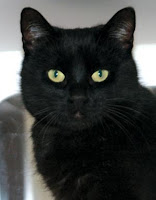This week the Yavapai Humane Society (YHS) staff asked me to feature Portia, a staff favorite. Portia is a 4-year-old domestic short hair with a spice for life; described as cool, calm, confident, playful and a joy to be around. She is mellow enough to get along with a cat-savvy dog and respectful children.
Portia has had many suitors in her two months with YHS, but potential adopters quickly lost interest when they learned she has feline immunodeficiency virus (FIV).
FIV has been responsible for the unnecessary killing of far too many cats in way too many animal shelters for too many years; and that is not right, because FIV cats often live long, healthy lives with few to no symptoms.
FIV is an endemic disease found in domestic cats worldwide. It is a lentivirus, which means it progresses slowly, gradually affecting a cat's immune system. Cats are typically infected through a bite inflicted by a stray male cat - earning it the moniker "the fighting cat" disease.
The best-known lentivirus in humans is HIV - but there are major differences between FIV and HIV. HIV cannot infect cats and FIV cannot infect humans. In over 6,000 years of human/cat cohabitation, there has never been any evidence of an FIV cat infecting a human.
The fear concerning FIV cats is unfounded. I am the proud owner of an FIV cat, named Oliver, who lives happily with my FIV-free cat, Beau Bentley (for the past four years). I am distressed by the unwarranted apprehension I find among so many cat lovers regarding FIV.
As long as FIV cats are not exposed to diseases their immune system can't handle, they can live relatively normal lives. Kept indoors, as we recommend for all cats, health risks are significantly reduced. FIV is not easily passed between cats; it cannot be spread casually - in litter boxes, water and food bowls, or through snuggling and playing. It requires a serious bite to transmit the disease from cat to cat.
Before we knew FIV existed, shelters routinely placed FIV cats into loving homes where they often lived long, normal lives. The discovery of FIV in 1986 brought with it an undeserved stigma that has since made placing these wonderful animals more difficult.
Dr. Susan Cotter, professor of hematology and oncology at Tufts University School of Veterinary Medicine, is helping counteract these misinformed fears. "I would not advise getting rid of a cat that tests positive for FIV," she says. "If the cat is young and healthy, it could be years before anything changes."
The important thing is to keep your FIV cat healthy, which is good advice for all cats. In fact, the same advice we offer FIV cat adopters is equally appropriate for all cats. That is, all cats should be kept as healthy as possible; kept indoors and free from stress, fed a high-quality diet, and medical problems should be treated as soon as they arise.
If you already own a cat, ask your veterinarian (or the YHS Wellness Clinic) about early detection to help maintain his health and to help prevent the spread of this infection to other cats.
Although many FIV cats live long, happy lives, some may need periodic medical care or ongoing medical management. That is why adopting a special-needs animal is such a noble and selfless act. If you can find room in your heart and home for Portia, or a cat like her, visit the Yavapai Humane Society and take advantage of our drastically reduced adoption fees in celebration of our 40th anniversary.
Ed Boks is the executive director of the Yavapai Humane Society. He can be reached at eboks@yavapaihumane.org or by calling 445-2666, ext. 21.
skip to main |
skip to sidebar


Interesting Sites
Search This Blog
About Ed Boks
- Ed Boks is the former General Manager of LA Animal Services.
- Los Angeles, California, United States
- Ed Boks has served as executive director for three of the largest animal control programs in the United States: the City of Los Angeles, New York City and Maricopa County, Arizona. Ed's transformational approach to animal control led these departments to becoming the largest volume adoption centers in the nation with the lowest euthanasia rates in each respective agency's history. Ed's approach incorporates strategic organizational development and planning. Ed's strengths include Visioning; Strategic Planning; Public Relations; Communication (Oral and Written); Team Building and Recruitment; Turn Around, Performance, and Transparent Management; Contract Negotiation; National Speaking and Consulting; Teaching and Training; Curriculum Development; Lobbyist; Multi-Million Dollar Capital Project Management. Ed is currently serving as Executive Director of Yavapai Humane Society in Arizona.



